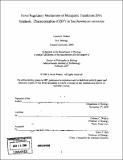Novel regulatory mechanisms of mutagenic translesion DNA synthesis : characterization of REV1 in Saccharomyces cerevisiae
Author(s)
Waters, Lauren S. (Lauren Stacey)
DownloadFull printable version (12.18Mb)
Other Contributors
Massachusetts Institute of Technology. Dept. of Biology.
Advisor
Graham C. Walker.
Terms of use
Metadata
Show full item recordAbstract
Cells are constantly subjected to DNA damage from endogenous and exogenous sources. Spontaneous DNA damage alone accounts for -30,000 DNA lesions per day in a mammalian cell. Cells are also exposed to an enormous variety of environmental agents that can cause a wide range of modified bases and aberrant DNA structures. To respond to the large diversity of DNA lesions that can be produced, cells possess a host of DNA repair and damage tolerance systems. The majority of these processes operate with exquisite accuracy to restore the correct DNA sequence and structure to maintain genomic stability. However, in some cases, DNA damage induces a mutagenic response and these mechanisms are responsible for the active introduction of mutations into the genomes of all organisms. Since the discovery in 1999 of a novel superfamily of error-prone translesion DNA polymerases, we have gained substantial insight into the biochemical mechanisms of DNA damage tolerance and mutagenesis. Translesion polymerases are specialized to insert a nucleotide opposite to DNA lesions and often produce mutations during the replication of undamaged DNA. It is now appreciated that the regulation of DNA damage tolerance systems at multiple levels is critical to the appropriate deployment of these potentially mutagenic translesion polymerases to prevent rampant mutagenesis. (cont.) In particular, this thesis has focused on determining the regulation of the translesion polymerase Revl in the model organism Saccharomyces cerevisiae. The REV1 gene is responsible for the vast majority of spontaneous and damage-induced mutagenesis in all eukaryotes, from unicellular yeast to multicellular humans. Thus, an understanding the regulation and molecular mechanisms of REV1 activity will provide critical insight into the processes of mutagenesis underlying disease and evolution. The studies described here provide evidence supporting a new model of translesion synthesis, based on the observation of the cell-cycle regulation of the Revs protein. Additionally, mutations in conserved motifs in Revl have allowed characterization of the protein-protein interactions critical for REV1 activity in survival and mutagenesis. Taken together, the data presented here argue for a cellular response mediated through Rev regulation which temporally and spatially restricts potentially mutagenic translesion synthesis such that it is employed only when necessary.
Description
Thesis (Ph. D.)--Massachusetts Institute of Technology, Dept. of Biology, 2007. Includes bibliographical references.
Date issued
2007Department
Massachusetts Institute of Technology. Department of BiologyPublisher
Massachusetts Institute of Technology
Keywords
Biology.